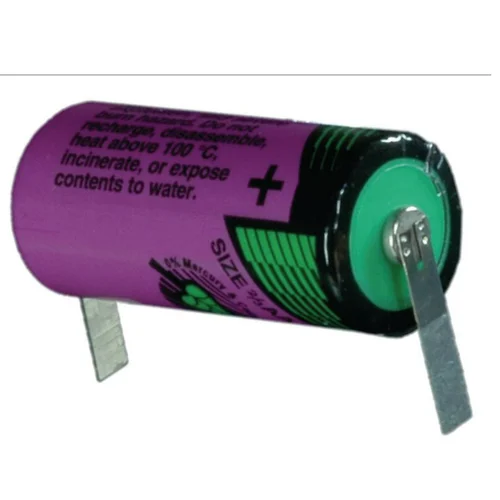SL-361/T, 3.6V, 2/3AA, Lithium, Tadiran Batteries
₹599.0
| Brand | Tadiran |
| Voltage | 3.6V |
| Battery Size Code | 2/3AA |
| Chemistry | Lithium Battery |
| Model Number | SL-361/T |
- Description
- Additional information
- Reviews (0)
- Q & A
- Sustainability Remark
- More Offers
- Store Policies
- Inquiries
The SL-361/T is a 3.6V lithium battery produced by Tadiran Batteries. It has a 2/3AA size and is commonly used in industrial and commercial applications.
Additional Information:
- Delivery Time: 48 hr
- Packaging Details: Packaged in a moisture-resistant blister pack with clear labeling and markings. Bulk shipments may include additional protective boxes or trays. The packaging is designed to provide maximum protection and clarity for the product during transportation and storage.
| brands | TADIRAN |
|---|
You must be logged in to post a review.
Q & A
Electrochemical batteries are a commonly used energy storage technology and play a crucial role in various applications, including portable electronics, electric vehicles, and renewable energy systems. The sustainability of electrochemical batteries depends on several factors, including their environmental impact throughout their lifecycle, resource availability, and recycling capabilities.
Environmental Impact: The environmental impact of electrochemical batteries can vary depending on the specific type of battery chemistry. Some battery chemistries, such as lead-acid batteries, contain toxic and hazardous materials that can pose risks if not properly managed. However, other chemistries, such as lithium-ion batteries, have a lower environmental impact and a higher energy density. Efforts are being made to develop more sustainable and environmentally friendly battery chemistries, such as solid-state batteries and lithium-sulfur batteries.
Resource Availability: The sustainability of batteries is also influenced by the availability of the resources required for their production. For example, lithium-ion batteries require the extraction of lithium, cobalt, nickel, and other minerals, which can have social and environmental impacts, especially if not responsibly sourced. However, research is being conducted to reduce the reliance on critical resources and develop alternative materials for battery production.
Recycling and End-of-Life Management: Proper recycling and end-of-life management are critical for the sustainability of electrochemical batteries. Batteries contain valuable materials that can be recovered and reused, reducing the need for new resource extraction. Additionally, appropriate recycling processes can help minimize environmental pollution and the release of toxic substances. Efforts are being made to improve battery recycling technologies and establish effective recycling infrastructure.
It's important to note that sustainability is a multifaceted concept, and the evaluation of electrochemical batteries' sustainability involves considering various environmental, social, and economic factors. While significant progress has been made in improving the sustainability of electrochemical batteries, there is ongoing research and development to further enhance their environmental performance and address associated challenges.
General Inquiries
There are no inquiries yet.



















Reviews
There are no reviews yet.